In the College of Social Work, faculty, staff, and students are challenged to put classroom lessons to work in the community to make the world a better place, especially for underserved populations.
Here’s a look at four college programs that look to fill voids, right wrongs, and improve lives—all while teaching the next generation of social workers to do the same.
Forensic Social Work Certificate Program
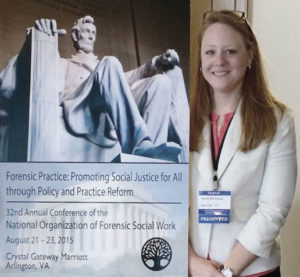
Alumnus Sarah Buchanan is assisting the College of Social Work in the development of our Forensic Social Work program.
The United States has one of the world’s highest incarceration rates, with more than seven million people in jail, on parole, doing community service, or otherwise under correctional supervision.
The huge need for social workers to work with—or on behalf of—this population and their families was the impetus behind the creation of the Forensic Social Work certificate program, launched this fall by the College of Social Work and the College of Law.
Ragan Schriver, associate professor of practice and MSSW program director, chairs the certificate program. He’s taught at UT since 2002, and during that time he’s also served as executive director and a consultant at Catholic Charities and pastored two Catholic churches. Before coming to UT, he was a counselor in the Community Alternatives to Prison Program (CAPP) through the Knox County Sheriff’s Office.
Schriver said certificate students learn about policies, social issues, legal matters, and even other issues that can impact people embroiled in the correctional system.
“This is a fairly new area in the profession,” he said “Having a certificate demonstrates to a future employer that the graduate has taken an extra step to gain a significant skill set and knowledge base that others may not have.”
Ten students are in the certificate program this year. Embedded in the two-year MSSW curriculum, the certificate program requires students to take two additional courses in the summer between the academic years.
“Besides the coursework, the students are required to do a field placement in a forensic setting like CAPP, the public defender’s office, the Department of Children’s Services, or in elder law or in juvenile court,” Schriver said. “They do the internship for one academic year, three days a week, along with their coursework.”
Having worked with clients in the correctional system himself, Schriver understands how beneficial the training will be for students.
“At CAPP, I saw quite often how the system ended up pushing clients into negative decision-making patterns,” he said. “I also saw how correctional facilities were filled with a lot of people suffering from mental illness, addiction, and economic problems.”
As executive director of Catholic Charities, Schriver saw the intricacies of the child welfare system, including juvenile justice concerns.
In both jobs, Schriver found himself testifying in court, visiting jails, and working with family members of incarcerated people.
“I learned about how we are all human and are just struggling to make it,” he said. “I learned so much from those clients about myself and the world I live in. I am forever grateful to them.
“It would have benefited me to have had this knowledge prior to my practice,” he said. “Hopefully our students will get this exposure due to the FSW certificate.”
Coalition of Black Social Workers
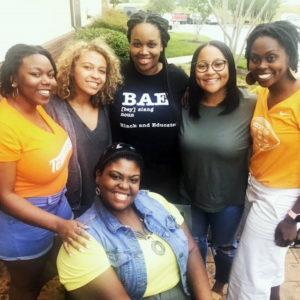
The officers of the Coalition of Black Social Workers at an event to discuss racism.
Online MSSW student Jazmynn Hardy attended a small private Christian liberal arts college in Alabama and, more than once, was the only black student in her classes.
“I was used to being the voice representing those of color when topics of race were mentioned,” she said.
So at UT, she was excited to be in a class taught by Nashville-based Carmen Reese Foster, assistant professor of practice and online coordinator of MSSW field education.
“It was refreshing to see someone who looked like me and understood what students like myself were going through,” Hardy said.
Foster is faculty advisor for the Coalition of Black Social Workers, a group that began in 2018 as a project of the college’s Social Justice Innovation initiative.
The coalition currently includes about 105 students and professionals. The group started in Nashville and expanded to Knoxville. Online students are welcome, too.
The coalition—now a recognized student organization in the college—has brought in speakers, held social events, and is preparing to host a one-day conference in Nashville on February 7. Online student members and mentors meet monthly via Zoom.
Foster said research shows that minority students at predominantly white universities are more likely to stay in school if they have a mentor. Knowing that, the coalition’s goal is for every student of color in UT’s College of Social Work to be paired with a mentor who is a professional social worker in the community.
When Foster told Hardy about the Coalition of Black Social Workers, Hardy jumped at the chance to get involved.
“I wanted to take advantage of the mentorship program so I could be paired with a black social work professional who can give guidance and support that can help point me in the right direction,” she said.
The experience has helped Hardy feel supported and encouraged. Knowing how much it’s helped her, she wants to keep it going.
“Once I graduate, I plan to stay connected with the coalition and mentor a student who desires to ask me the same questions I asked others.”
Social Justice Innovation Initiative
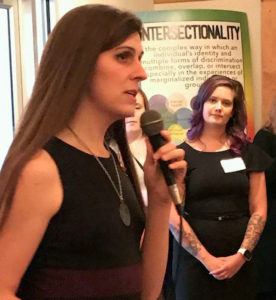
Danica Roem
The Social Justice Innovation initiative is a five-year effort that started in 2018 with the aim of spurring social change. Created through a $350,000 gift from college supporter Susan Cooper, the initiative awards $75,000 in grants each year to support various faculty and student projects.
Tony Murchison, the college’s special projects manager, who oversees the details of the program, said the money has allowed faculty and students to think big.
“When this started,” he said, “I told them, ‘Every one of us has ideas of things we’d like to do if we had money and time. This is the space you’ve been asking for.’”
Initiative projects have provided a bridge between coursework and fieldwork, a way for students and faculty to grow professionally and help the community.
Each calendar year, college leaders choose a theme and call for project proposals from faculty, staff, and students. Projects must have student involvement, and community collaborations are encouraged. A committee evaluates the ideas and invites finalists to personally pitch their plans.
During the inaugural year, 2018, the theme was “Challenge Racism.” Eleven student and faculty groups applied for funding, and four programs were funded.
Funded projects included promoting voting among Knoxville’s young adults of color, elevating the visibility of African American art and culture in Nashville, encouraging bystander intervention, and creating the Coalition of Black Social Workers.
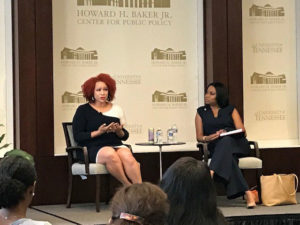
Nikole Hannah-Jones (left), a New York Times reporter and curator of the “1619” podcast with Tearsa Smith of WATE.
The 2019 theme was “Challenge Sexism, Racism, and Intersectionality,” and five projects were funded. The Nancy Humphreys Campaign School held a two-day event in Nashville to teach women social workers how to effect legislative change. Danica Roem, the first openly transgender person elected to the Virginia General Assembly, spoke in Knoxville against the backdrop of a student’s photography exhibit titled Images of Intersectionality. Sessions on addressing racism and sexism are under way with the Highlander Research and Education Center, a Tennessee organization that seeks to be a catalyst for grassroots organizing and movement building in Appalachia and the South. And in February the college will host Syd Yang, a bulimia survivor, for presentations about whole-body wellness for people of all genders.
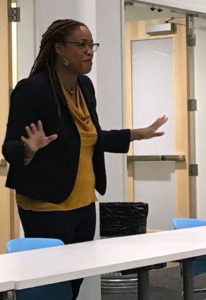
Heather McGhee lecture
College leaders decided that the fifth funded proposal—sending a group of students, faculty, and staff to the National Conference on Race and Ethnicity in Higher Education in Portland, Oregon—was such a good idea that the dean’s office contributed extra funding to allow a greater number of students and faculty to attend.
The initiative’s lecture series has featured Nikole Hannah-Jones, a New York Times reporter and curator of the 1619 podcast, and Heather McGhee, who helped develop multicultural training for Starbucks’s 175,000 employees. Austin Channing-Brown, author of I’m Still Here: Black Dignity in a World Made for Whiteness, spoke in Nashville last spring and will speak in Knoxville in February.
The theme “Sexism, Racism, and Intersectionality” will continue through 2020. Proposals are due February 15; awards will be announced in March.
Murchison and other college leaders are hoping additional monies can be raised to keep the initiative’s momentum going after the initial funding runs out in two years.
Knoxville Homeless Management Information System

A homeless camp in Knoxville.
Last year in Knox County, more than 9,100 people accessed services because they were homeless or at risk of becoming homeless.
Effectively serving this population requires significant coordination. And for 15 years, the Knoxville Homeless Management Information System has helped.
In 2004, David Patterson, now the director of UT’s College of Social Work’s clinical doctorate program and the Cooper-Herron Endowed Professor in Mental Health Research and Practice, and Professor Emeritus Roger Nooe received initial funding from the US Department of Housing and Urban Development to build a computer network to link local shelters and other service providers.
UT partnered with the City of Knoxville, the East Tennessee Coalition to End Homelessness, Knox County, and Comcast on the project, which culminated in the creation of the Knoxville Homeless Management Information System (KnoxHMIS).
Today, KnoxHMIS is an integrated network of 20 Knoxville area social-service agencies specializing in housing and homelessness assistance, all of which input data into the secure central information database. Patterson continues to direct KnoxHMIS; Lisa Higginbotham is program manager and authors the annual report.
“We like to say that KnoxHMIS is the empirical window into homelessness in this community,” Patterson said. “When we started data collection in 2004 almost all of the homeless service providers in the community were only collecting information on paper and only about the folks they served. That information was neither shared with the broader community nor with other agencies serving the homeless. In effect, KnoxHMIS broke open the silos of care for individuals experiencing homelessness by making it possible for agencies to see what services were being provided and to coordinate care. Doing so reduces duplication of services and better utilizes the scarce resources available to serve the community’s population of homeless individuals.”
The information collected informs the community’s CHAMP (Coordinated Housing Assessment Match Plan), which aims to quickly assess the needs and strengths of those experiencing homelessness to better match them to the most appropriate community resource. KnoxHMIS also provides an online housing resource guide and reports quarterly facts and outcomes related to homelessness to the public through the Community Dashboard on Homelessness.
“Our community is actively engaged in attempting to address the wickedly complex challenges associated with homelessness and its amelioration,” Patterson said. “KnoxHMIS’s job is to provide facts on the scope, magnitude, and change over time in the population of individuals and families experiencing homelessness in this community. While it’s not a direct service provider, it makes available information and analysis that can shape the community’s response to the needs of homeless and precariously housed individuals.”
 This story is part of the University of Tennessee’s 225th anniversary celebration. Volunteers light the way for others across Tennessee and throughout the world.
This story is part of the University of Tennessee’s 225th anniversary celebration. Volunteers light the way for others across Tennessee and throughout the world.

